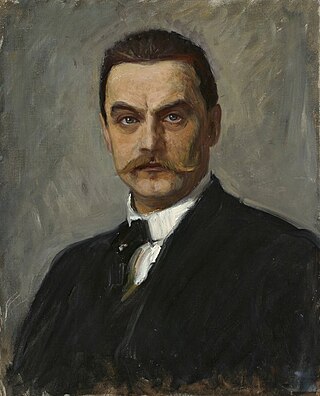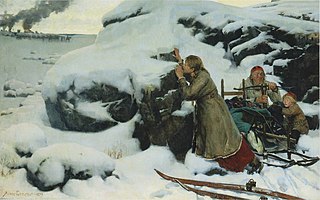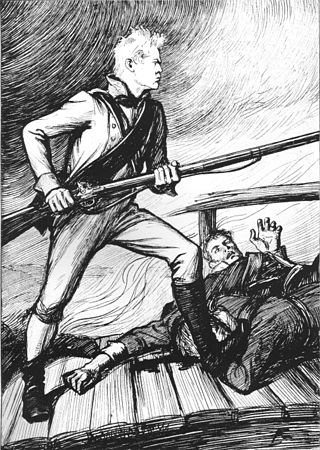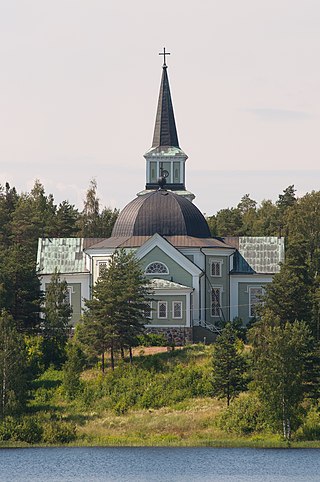
Albert Gustaf Aristides Edelfelt was a Finnish-Swedish painter noted for his naturalistic style and Realist approach to art. He lived in the Grand Duchy of Finland and made Finnish culture visible abroad, before Finland gained full independence.

The Cudgel War was a 1596–1597 peasant uprising in Finland, which was then part of the Kingdom of Sweden. The name of the uprising derives from the fact that the peasants armed themselves with various blunt weapons, such as cudgels, flails and maces, since they were seen as the most efficient weapons against their heavily-armoured enemies. The yeomen also had swords, some firearms and two cannons at their disposal. Their opponents, the troops of Clas Eriksson Fleming, were professional, heavily-armed and armoured men-at-arms.

The Tales of Ensign Stål is an epic poem written in Swedish by the Finland-Swedish author Johan Ludvig Runeberg, the national poet of Finland. The poem describes the events of the Finnish War (1808–1809) in which Sweden lost its eastern territories; these would become incorporated into the Russian Empire as the Grand Duchy of Finland.

Ateneum is an art museum in Helsinki, Finland and one of the three museums forming the Finnish National Gallery. It is located in the centre of Helsinki on the south side of Rautatientori square close to Helsinki Central railway station. It has the biggest collections of classical art in Finland. Before 1991 the Ateneum building also housed the Finnish Academy of Fine Arts and University of Art and Design Helsinki.

Finnish National Gallery is the largest art museum institution of Finland. It consists of the Ateneum, an art museum; Kiasma, a contemporary art museum; and the Sinebrychoff Art Museum, a historic house and art museum.

Larin Paraske was an Izhorian oral poet. She is considered a key figure in Finnish folk poetry and has been called the "Finnish Mnemosyne". Her frequent listeners included several romantic nationalist artists, such as Jean Sibelius, seeking inspiration from her interpretations of Kalevala, an epic poem compiled from Finnish folklore by Elias Lönnrot.

Pasteur's portrait by Edelfelt is the best-known portrait of the French chemist Louis Pasteur. Painted by Albert Edelfelt (1854–1905) in 1885 the painting shows Pasteur in his laboratory at the rue d'Ulm, surrounded by his experimental apparatus, the innovative laboratory glassware used in the experimental methods, developed by him on the field of bacteriology in the late 19th century. Pasteur is regarded as one of the main founders of bacteriology, and he is popularly known as the "father of microbiology".

The Abbey in the Oakwood is an oil painting by Caspar David Friedrich. It was painted between 1809 and 1810 in Dresden and was first shown together with the painting The Monk by the Sea in the Prussian Academy of Arts exhibition of 1810. On Friedrich's request The Abbey in the Oakwood was hung beneath The Monk by the Sea. This painting is one of over two dozen of Friedrich's works that include cemeteries or graves.

Gunnar Fredrik Berndtson was a Finnish painter who was noted for his attention to realistic detail.

Finnish art started to form its individual characteristics in the 19th century, when romantic nationalism began to rise in the autonomous Grand Duchy of Finland.

Luxembourg Gardens, Paris is an oil painting by Albert Edelfelt completed in 1887 of a scene in the Jardin du Luxembourg in Paris, France. The painting has become a kind of symbol of Edelfelt and the whole of Finnish art, at a time when Paris was the center of the whole art world. The work is also a larger Edelfelt paintings and a major en plein air painting.

The state funeral of Victoria, Queen of the United Kingdom of Great Britain and Ireland, Empress of India, occurred on 2 February 1901, after her death on 22 January. It was one of the largest gatherings of European royalty.

Anna Taina Aleksandra Kortelainen is a Finnish scholar, art historian and non-fiction writer.
Sigrid Emilia Lehrbäck was a Finnish painter.

Ruokolahti Church is the Lutheran church in the town centre of Ruokolahti, in south-eastern Finland, and the main church of the Ruokolahti parish.

The March of the Björneborg Regiment is a gouache painting by Finnish painter Albert Edelfelt completed in 1892.

Burnt village is a painting by Finnish painter Albert Edelfelt completed in 1879.

Kaukola Ridge at Sunset is a painting by Finnish painter Albert Edelfelt completed in 1890. The painting is considered part of the Golden Age of Finnish Art.

Boys Playing on the Shore is a painting by Finnish painter Albert Edelfelt completed in 1884.

Queen Blanche is a painting by Finnish painter Albert Edelfelt completed in 1877.


















